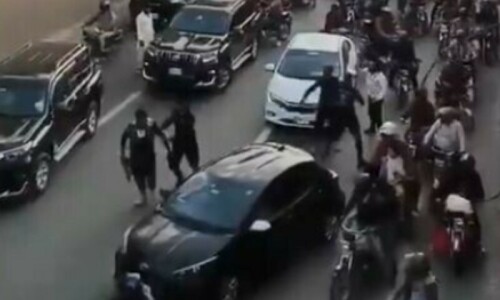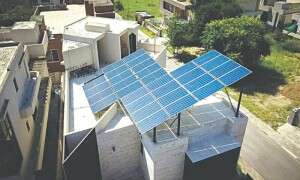ISLAMABAD: Major political parties are divided over the currently prescribed legal limit for campaign expenses, which constrains National Assembly candidates to spend no more than Rs1.5 million and provincial assembly hopefuls to Rs1 million.
Ahead of the 2013 general elections, a proposal was floated by the Election Commission of Pakistan (ECP) to increase the limit – imposed under section 49(2) of the Representation of Peoples Act – by four times, but this suggestion was rejected by a parliamentary panel.
During consultations with political parties on the proposed code of conduct for the 2018 elections, held on Oct 26, the Pakistan Tehreek-i-Insaaf (PTI) suggested a suitable increase in the limit on election expenses, according to minutes of the meeting available with Dawn.
PML-N representatives question ban on jalsa, jaloos during electioneering
It’s ally, the Sheikh Rashid Ahmed-led Awami Muslim League (AML) supported the demand and proposed that the limit should be enhanced to Rs2.5 million and Rs1.5 million for national and provincial assembly candidates, respectively.
The National Party (NP), in contrast, was of the view that these limits should be lowered to Rs500,000 and Rs200,000 for the national and provincial assembly hopefuls, respectively.
The Awami National Party (ANP) said that in addition to the contesting candidates, financial limits should also be fixed for political parties as a whole. The Muttahida Qaumi Movement (MQM) asked for political parties’ election expenditure to be monitored by the ECP and agreed to reasonable increases in the expenditure limits for individuals.
The Jamiat Ulema-i-Islam-Fazl (JUI-F) also wanted the expenditure limit to be strictly monitored by the ECP, while the Pakhtunkhwa Milli Awami Party (PkMAP) said that party expenditure should also be monitored and controlled by the ECP.
Jamaat-e-Islami (JI) representatives said that whatever amount was fixed for contesting national and provincial assembly candidates by the parliamentary committee on electoral reforms should also be monitored by the ECP.
PML-N representatives, meanwhile, opposed the proposal to ban on jalsa and jaloos as part of electioneering, saying that this was not covered in the law and since there were no parameters regarding political banners, the ECP could not ban them.
They claimed that a constituency in Balochistan was far bigger than a constituency in Punjab and Sindh, thus voters have to be provided vehicles by the contesting candidates to bring them to and from polling stations. If the transport facility is to be provided by the ECP, then a clear mechanism should be devised.
Representatives of the Pakistan Muslim League (PML-Q) observed that there should be a mechanism in the code of conduct to stop pre-poll rigging in the form of development announcements.
A senior ECP official said the political parties had yet to make proposals on the draft code of conduct for 2018 general elections, prepared by the ECP.
The ECP had sent its draft code of conduct to 16 political parties before holding a consultative session on Oct 26. None of the party chiefs chose to attend the meeting in person and their representatives made no significant proposals.
They were asked by the ECP to send their proposals on the code of conduct to the ECP as part of the exercise to finalize it through a consultative process.
The draft code of conduct proposes a blanket ban on all public rallies, advertisements in electronic and print media, billboards, hoardings, banners, posters, flyers, wall-chalking, loudspeakers and car rallies during election campaigns.
Published in Dawn, November 10th, 2016













































